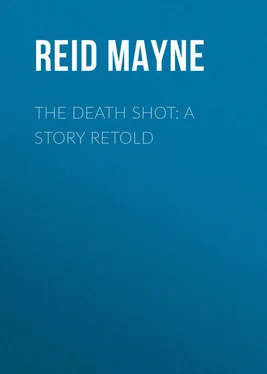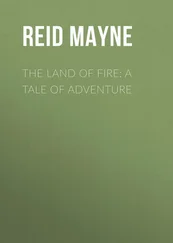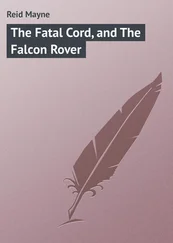Mayne Reid - The Death Shot - A Story Retold
Здесь есть возможность читать онлайн «Mayne Reid - The Death Shot - A Story Retold» — ознакомительный отрывок электронной книги совершенно бесплатно, а после прочтения отрывка купить полную версию. В некоторых случаях можно слушать аудио, скачать через торрент в формате fb2 и присутствует краткое содержание. Жанр: literature_19, foreign_antique, foreign_prose, на английском языке. Описание произведения, (предисловие) а так же отзывы посетителей доступны на портале библиотеки ЛибКат.
- Название:The Death Shot: A Story Retold
- Автор:
- Жанр:
- Год:неизвестен
- ISBN:нет данных
- Рейтинг книги:3 / 5. Голосов: 1
-
Избранное:Добавить в избранное
- Отзывы:
-
Ваша оценка:
- 60
- 1
- 2
- 3
- 4
- 5
The Death Shot: A Story Retold: краткое содержание, описание и аннотация
Предлагаем к чтению аннотацию, описание, краткое содержание или предисловие (зависит от того, что написал сам автор книги «The Death Shot: A Story Retold»). Если вы не нашли необходимую информацию о книге — напишите в комментариях, мы постараемся отыскать её.
The Death Shot: A Story Retold — читать онлайн ознакомительный отрывок
Ниже представлен текст книги, разбитый по страницам. Система сохранения места последней прочитанной страницы, позволяет с удобством читать онлайн бесплатно книгу «The Death Shot: A Story Retold», без необходимости каждый раз заново искать на чём Вы остановились. Поставьте закладку, и сможете в любой момент перейти на страницу, на которой закончили чтение.
Интервал:
Закладка:
A man’s name is heard among his mutterings, more than once repeated.
As Dick Darke, after thrusting letter and picture into his pocket, strides away from the spot, his clenched teeth, with the lurid light scintillating in his eyes, to this man foretell danger – maybe death.
Chapter Four.
Two good girls
The dark cloud, long lowering over Colonel Armstrong and his fortunes, is about to fall. A dialogue with his eldest daughter occurring on the same day – indeed in the same hour – when she refused Richard Darke, shows him to have been but too well aware of the prospect of impending ruin.
The disappointed suitor had not long left the presence of the lady, who so laconically denied him, when another appears by her side. A man, too; but no rival of Richard Darke – no lover of Helen Armstrong. The venerable white-haired gentleman, who has taken Darke’s place, is her father, the old colonel himself. His air, on entering the room, betrays uneasiness about the errand of the planter’s son – a suspicion there is something amiss. He is soon made certain of it, by his daughter unreservedly communicating the object of the interview. He says in rejoinder: —
“I supposed that to be his purpose; though, from his coming at this early hour, I feared something worse.”
These words bring a shadow over the countenance of her to whom they are addressed, simultaneous with a glance of inquiry from her grand, glistening eyes.
First exclaiming, then interrogating, she says: —
“Worse! Feared! Father, what should you be afraid of?”
“Never mind, my child; nothing that concerns you. Tell me: in what way did you give him answer?”
“In one little word. I simply said no .”
“That little word will, no doubt, be enough. O Heaven! what is to become of us?”
“Dear father!” demands the beautiful girl, laying her hand upon his shoulder, with a searching look into his eyes; “why do you speak thus? Are you angry with me for refusing him? Surely you would not wish to see me the wife of Richard Darke?”
“You do not love him, Helen?”
“Love him! Can you ask? Love that man!”
“You would not marry him?”
“Would not – could not. I’d prefer death.”
“Enough; I must submit to my fate.”
“Fate, father! What may be the meaning of this? There is some secret – a danger? Trust to me. Let me know all.”
“I may well do that, since it cannot remain much longer a secret. There is danger, Helen — the danger of debt ! My estate is mortgaged to the father of this fellow – so much as to put me completely in his power. Everything I possess, land, houses, slaves, may become his at any hour; this day, if he so will it. He is sure to will it now. Your little word ‘no,’ will bring about a big change – the crisis I’ve been long apprehending. Never mind! Let it come! I must meet it like a man. It is for you, daughter – you and your sister – I grieve. My poor dear girls; what a change there will be in your lives, as your prospects! Poverty, coarse fare, coarse garments to wear, and a log-cabin to live in! Henceforth, this must be your lot. I can hold out hope of no other.”
“What of all that, father? I, for one, care not; and I’m sure sister will feel the same. But is there no way to – ”
“Save me from bankruptcy, you’d say? You need not ask that. I have spent many a sleepless night thinking it there was. But no; there is only one – that one. It I have never contemplated, even for an instant, knowing it would not do. I was sure you did not love Richard Darke, and would not consent to marry him. You could not, my child?”
Helen Armstrong does not make immediate answer, though there is one ready to leap to her lips.
She hesitates giving it, from a thought, that it may add to the weight of unhappiness pressing upon her father’s spirit.
Mistaking her silence, and perhaps with the spectre of poverty staring him in the face – oft inciting to meanness, even the noblest natures – he repeats the test interrogatory: —
“Tell me, daughter! Could you marry him?”
“Speak candidly,” he continues, “and take time to reflect before answering. If you think you could not be contented – happy – with Richard Darke for your husband, better it should never be. Consult your own heart, and do not be swayed by me, or my necessities. Say, is the thing impossible?”
“I have said. It is impossible !”
For a moment both remain silent; the father drooping, spiritless, as if struck by a galvanic shock; the daughter looking sorrowful, as though she had given it.
She soonest recovering, makes an effort to restore him.
“Dear father!” she exclaims, laying her hand upon his shoulder, and gazing tenderly into his eyes; “you speak of a change in our circumstances – of bankruptcy and other ills. Let them come! For myself I care not. Even if the alternative were death, I’ve told you – I tell you again – I would rather that, than be the wife of Richard Darke.”
“Then his wife you’ll never be! Now, let the subject drop, and the ruin fall! We must prepare for poverty, and Texas!”
“Texas, if you will, but not poverty. Nothing of the kind. The wealth of affection will make you feel rich; and in a lowly log-hut, as in this grand house, you’ll still have mine.”
So speaking, the fair girl flings herself upon her father’s breast, her hand laid across his forehead, the white fingers soothingly caressing it.
The door opens. Another enters the room – another girl, almost fair as she, but brighter, and younger. ’Tis Jessie.
“Not only my affection,” Helen adds, at sight of the newcomer, “but hers as well. Won’t he, sister?”
Sister, wondering what it is all about, nevertheless sees something is wanted of her. She has caught the word “affection,” at the same time observing an afflicted cast upon her father’s countenance. This decides her; and, gliding forward, in another instant she is by his side, clinging to the opposite shoulder, with an arm around his neck.
Thus grouped, the three figures compose a family picture expressive of purest love.
A pleasing tableau to one who knew nothing of what has thus drawn them together; or knowing it, could truly appreciate. For in the faces of all beams affection, which bespeaks a happy, if not prosperous, future – without any doubting fear of either poverty, or Texas.
Chapter Five.
A photograph in the forest
On the third day, after that on which Richard Darke abstracted the letter from the magnolia, a man is seen strolling along the edge of the cypress swamp. The hour is nearly the same, but the individual altogether different. Only in age does he bear any similarity to the planter’s son; for he is also a youth of some three or four and twenty. In all else he is unlike Dick Darke, as one man could well be to another.
He is of medium size and height, with a figure pleasingly proportioned. His shoulders squarely set, and chest rounded out, tell of great strength; while limbs tersely knit, and a firm elastic tread betoken toughness and activity. Features of smooth, regular outline – the jaws broad, and well balanced; the chin prominent; the nose nearly Grecian – while eminently handsome, proclaim a noble nature, with courage equal to any demand that may be made upon it. Not less the glance of a blue-grey eye, unquailing as an eagle’s.
A grand shock of hair, slightly curled, and dark brown in colour, gives the finishing touch to his fine countenance, as the feather to a Tyrolese hat.
Dressed in a sort of shooting costume, with jack-boots, and gaiters buttoned above them, he carries a gun; which, as can be seen, is a single-barrelled rifle; while at his heels trots a dog of large size, apparently a cross between stag-hound and mastiff, with a spice of terrier in its composition. Such mongrels are not necessarily curs, but often the best breed for backwoods’ sport; where the keenness of scent required to track a deer, needs supplementing by strength and staunchness, when the game chances, as it often does, to be a bear, a wolf, or a panther.
Читать дальшеИнтервал:
Закладка:
Похожие книги на «The Death Shot: A Story Retold»
Представляем Вашему вниманию похожие книги на «The Death Shot: A Story Retold» списком для выбора. Мы отобрали схожую по названию и смыслу литературу в надежде предоставить читателям больше вариантов отыскать новые, интересные, ещё непрочитанные произведения.
Обсуждение, отзывы о книге «The Death Shot: A Story Retold» и просто собственные мнения читателей. Оставьте ваши комментарии, напишите, что Вы думаете о произведении, его смысле или главных героях. Укажите что конкретно понравилось, а что нет, и почему Вы так считаете.












